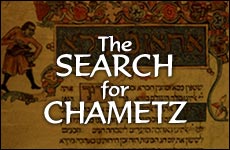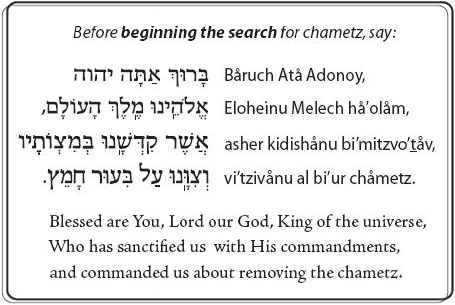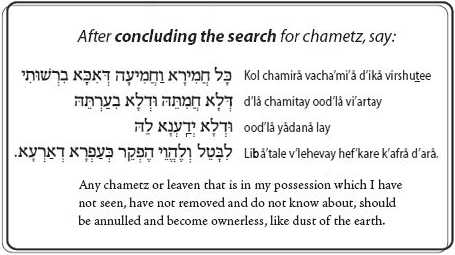 Iran’s Attack on Israel
Iran’s Attack on Israel


9 min read
Besides the weeks of cleaning is the essential search the night before Passover.
1. When should bedikas chametz be done?
At nightfall on the evening of the fourteenth of Nissan.
2. What if a person is unable to begin the search at nightfall?
He should begin as soon as possible.
3. When should one daven Maariv?
The custom is to daven Maariv at nightfall and do bedikas chametz immediately afterwards.
4. What if a person is usually at work at nightfall?
Every effort should be made to start bedikas chametz at nightfall. Therefore, a person should leave his place of work before nightfall in order to do bedikas chametz on time.
5. Is there any work restriction before nightfall?
Yes. When a person is involved in various activities he may not notice the passage of time, and may miss the ideal time to do bedikas chametz. Therefore, one may not start any new activity within half-an-hour before nightfall. If one began before the half-hour period, one may continue until nightfall. At nightfall, one must stop all activities.
6. May one eat or drink before bedikas chametz?
During the half-hour before nightfall, one may not eat more than a kebeitza of bread or cake. There is no restriction on other foods or drinks during this period. At nightfall, one should begin the search without delay.
7. Is a blessing recited over the search?
Before beginning the search one should recite the blessing:

8. What if a person forgot to recite the blessing?
The blessing should be recited if the search has not yet been concluded.
If one finished the entire search without reciting the blessing, according to some opinions, the blessing may be recited before the chametz is burned on the following day.
9. Must the homeowner himself do the search?
Ideally, yes. If he wishes, he may ask another person to assist in the search, and in extenuating circumstances may even ask another person to do the entire search on his behalf.
10. Should every person who is going to assist in the search recite the blessing?
No. They should listen to the blessing that the homeowner recites and say "amen."
11. Who should recite the blessing if the homeowner himself is not participating in the search?
The person who is doing the search should recite the blessing. If possible, the homeowner himself should recite the blessing and search a little.
12. What should one have in mind before reciting this blessing?
A person should have in mind that he is starting to fulfill the mitzvah to destroy his chametz, and will conclude the mitzvah on the following day.
13. What if a person speaks after reciting the blessing before beginning the search?
It is forbidden to speak after reciting the blessing before beginning the search. A person who speaks must repeat the blessing, unless what he says is connected to the search.
14. What if he speaks about unrelated matters during the search?
The blessing does not need to be repeated. However, in order not to be distracted from the search, one should not speak unnecessarily.
15. Should a person repeat the blessing if he has more than one property to search?
No. He should go without interruption from one place to the other and continue his search there.
16. What if he was unavoidably interrupted between checking two properties?
The blessing should not be repeated.
17. Must one's office be searched on the night of the fourteenth of Nissan?
Ideally, yes. If it is far from the house and it is very inconvenient to travel there on the night of the fourteenth, he should include the office in the sale of chametz (provided he will not be there during chol hamoed). Alternatively, he should search the office without a blessing on the previous evening. (see also question 30)
18. What should one look for when doing bedikas chametz?
Every part of the house must be checked for chametz and it is not sufficient to simply look for the "ten pieces of bread" (see question 22). Even if many days have already been spent cleaning the house, one must utilize this opportunity to confirm that every part of the house has indeed been thoroughly cleaned and that chametz has not been brought there since.
Before the search, one should put out of children's reach all chametz that is to be sold to a non-Jew or that one yet wishes to eat. Similarly, all chametz found during the search should be put in a safe place until it is burned the next morning.
19. Which parts of the house should be checked?
One must check any area that chametz may have been brought into during the year. Since it is common for small children to carry food around the house, one must check any area that they may have entered.
20. Must one search the areas that are being sold to a non-Jew?
Opinions differ about this, but the main custom is not to search these areas, since any chametz there will in any case be sold to a non-Jew. One may even deliberately avoid checking sections of the house for chametz, and include them in the sale. A person who does not wish to rely on the sale for definite chametz should search these areas for definite chametz.
21. If the whole house has been thoroughly cleaned before Pesach, why is there a search for chametz on the night of the fourteenth?
According to some opinions, one does not need to search a house that clearly contains no chametz. Other opinions require the search in any event. In order to satisfy both opinions, one part of the house should not be cleaned thoroughly beforehand.
22. Why are "ten pieces of bread" distributed around the house before the search?
In order that the search can be performed with a blessing in a house that is completely clean, the custom is to distribute ten pieces of bread around the house before the search. Whoever puts out the pieces should make a note of where they are located, in case any are not found during the search.
23. What should be the size of these pieces?
Each piece should be less than the size of a kezayit (15 grams). The pieces should be wrapped, to ensure that they do not leave crumbs around the house.
24. What should be done if not all the pieces were found during the search?
One is not required to search the house again to find the last piece(s), and one may rely on the declaration that all unseen chametz shall be null and void.
25. May a flashlight be used for the search?
It is perfectly acceptable to use a flashlight, although many maintain their custom and conduct part or all of the search with a wax candle. In places where a person is hesitant to take a candle (e.g. a clothes closet), a flashlight must be used.
26. Should the electric lights be turned off during the search?
The lights may be left on since they assist in the search. If they disturb the effectiveness of the candle or flashlight, they should be turned off.
27. When should the first nullification of chametz be said?
This should be said immediately after the search.

If one forgot to nullify the chametz immediately after the search, he should say the nullification as soon as he remembers.
28. Must the nullification be said in the original Aramaic?
It is crucial for a person to understand what he is saying and recite it in a familiar language. If he does not understand the Aramaic words, he should say the following declaration in English: "All chametz and leaven that is in my possession that I have not seen, that I have not destroyed, and that I do not know about, shall be null and ownerless like the dust of the earth." (Some have the custom to say the nullification three times.)
29. How should bedikas chametz be done in a house that will not be used during Pesach?
A person who does not want to sell food that is definitely chametz should remove pieces of chametz from the house. If the departure date is after Purim, a search for chametz must be made on the evening before departure, but a blessing is made only if the search is done on the night of the fourteenth of Nissan. The standard sale of chametz should also be arranged before leaving.
A person who has the custom to sell food that is definitely chametz does not need to do any cleaning. Instead, he should arrange a special sale of chametz that takes effect before the fourteenth of Nissan. This creates an exemption from searching the house for chametz. [It is preferable for a person who is leaving after Purim to exclude one room from the sale in order to fulfill the mitzvah of bedikas chametz in that room.
30. What are the rules of bedikas chametz when performed prior to the night of the fourteenth?
If a person or a family leaves the house before the night of the fourteenth, bedikas chametz must be performed on the evening before departure. In this situation, all the rules of bedikas chametz apply fully (e.g. searching at nightfall, not working or eating beforehand), with two exceptions: 1) A blessing is not recited, 2) it is not necessary to distribute ten pieces of bread. The nullification should be said as usual after the search.
31. Is a visitor required to do bedikas chametz?
A visitor is not required to do bedikas chametz even if he is given a private room in the host's house. This includes married children who go to their parents for Pesach.
A visitor is required to do bedikas chametz at his own home on the night of the fourteenth. If he goes to his host before the night of the fourteenth, he should do bedikas chametz without a blessing on the night before he leaves home (see previous question). If he is selling the entire house to a non-Jew, he is exempt from bedikas chametz. According to some opinions, one part of the house should not be sold, so that he can fulfill the mitzvah of bedikas chametz there.
32. Are dormitory students obligated to do bedikas chametz?
Students who live in a dormitory are obligated to do bedikas chametz in their rooms on the night of the fourteenth with a blessing. If they intend to leave the dormitory before the night of the fourteenth, they should do bedikas chametz without a blessing on the evening before they leave.
Excerpted from "Guidelines" - over 500 commonly asked questions about Pesach (Targum/Feldheim).
